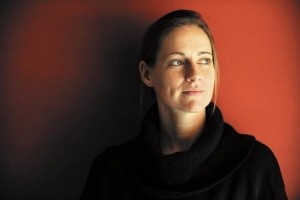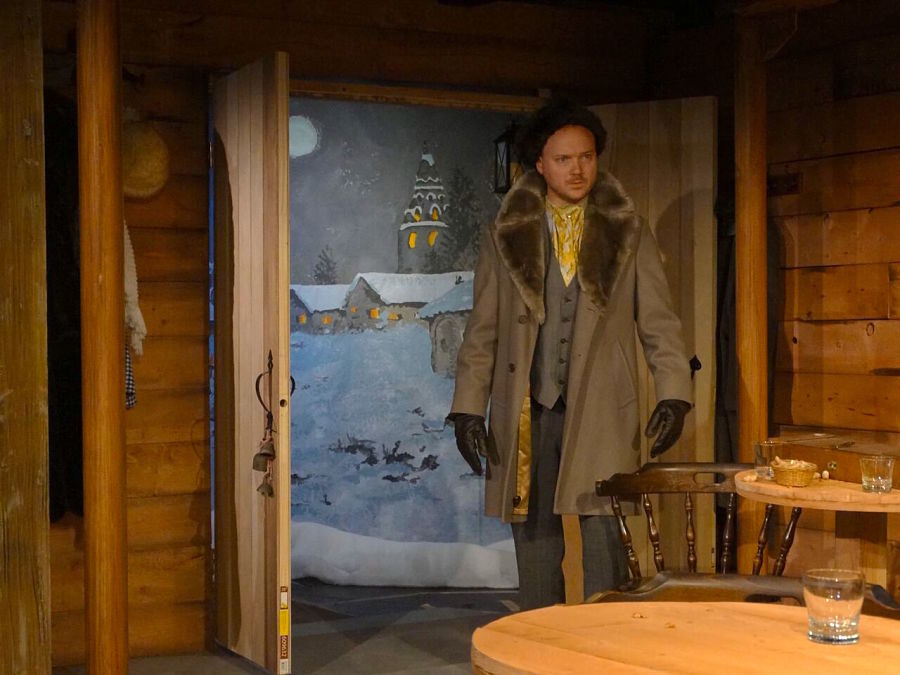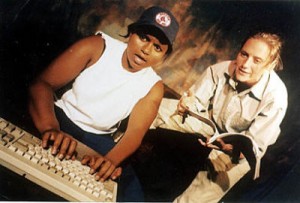WELLFLEET, MASS: Four summers ago a half dozen young theatremakers who’d first met and worked together at Wellfleet Harbor Actors Theater (WHAT) banded together and took over WHAT’s former second stage—a small, 88-seat former windsurfing shop close to Mayo Beach on Cape Cod—and started mounting a summer season of new plays and adapted classics under the new name Harbor Stage Company.
Now the theatre’s in the hands of a remaining core of four: Brenda Withers, Jonathan Fielding, Stacy Fischer, and artistic director Robert Kropf. While Kropf tends to be the theatre’s resident adaptor/director, Withers—an actor/playwright best known for the 2003 play she wrote with Mindy Kaling, Matt and Ben—is the theatre’s in-house playwright, having written the historical play The Billingsgate Project and, running now, a new Chekhovian comedy called The Kritik (July 14-Aug. 6). I spoke with Withers a few weeks ago about theatre on the Cape, the state of criticism, and how a bloody nose might have changed her career.
Your theatre is right over the water, isn’t it?
We’re about 100 feet from the water.
Oh—somehow I got the mental picture of it being literally a box on stilts, with two legs on land and two in the water.
One more hurricane and it will be!
So tell me about The Kritik.
It’s a 10-person comedy about a small-town theatre critic trying to write his first honest review. It’s slightly inspired by our experiences here.

How so?
So much of the art here is invested in the community, and vice versa, that it’s hard for people to really say what they think. I mean, people have been accused of hurting the economy because they wrote a bad review. And those charges can actually be leveled personally because it’s such a small town, you’re always running into people.
Because there are so many theatres on Cape Cod, we pride ourselves on creating something different, not just summer stock and musicals; we do new plays and dramas, plays by Young Jean Lee, Lisa D’Amour. Now, it’s possible that every play on Cape Cod is amazing, but if you read that in every review, you start to have no frame of reference. I think there actually had been a symposium of critics, and someone got up and said, “It’s your responsibility to write a good review, because otherwise these theatres aren’t going to survive.” I was shocked to hear that presented to a critic.
So when the adjectives that describe your play stop meaning anything, you just go back to telling a story to your community. We’re not giant fans of formal talkbacks, but every night at the Harbor we do an informal talkback after the show. That is a direct form of dialogue and criticism with our audiences, and they have become our most direct critics. I feel like our audience is half fishermen and half retired psychiatrists—in other words, a lot of people who tell it like it is. It’s a reminder of the general idea that theatre is supposed to democratic. It’s really live. So it’s created this grass-roots ambassadorship, where they’ll tell their friends if they like a show.
Obviously “kritik” is not a real spelling, let alone a Russian one.
Yeah, I originally wrote it for students at the University of North Carolina and it didn’t have a title. And someone said, “You need a title,” and that’s what I came up with. Then we did a reading of the play last year here, and the response was so great. It’s set in a fake Russian province in the 19th century and has a lot of nods to Chekhov, but the audience just felt that it was so relevant to our community.

So the play is not an attack on critics?
Certainly that’s how I started. But I think it’s quite fair to everybody. Everybody gets their piece heard in the play. It’s not an attack, it’s more a meditation.
Is the critic in your play really just a frustrated playwright, as many people seem to assume is the case with critics they don’t like?
He’s divorced from the town playwright, whose work he is reviewing. And that feels very true to our world—that the people who are judging your work may be people you used to live with, or who run the corner store.
As a writer you’re best known for Matt and Ben, which had a meta-theatrical conceit—that a couple of bros like Matt Damon and Ben Affleck couldn’t possibly have written something as great as Good Will Hunting but that the script literally dropped from the sky into their apartment. The Kritik is a play about people making and criticizing theatre, so is it safe to assume it’s also pretty meta?
It has some minor meta moments, but it’s a lot more straightforward.

I missed Matt and Ben, but I do remember the splash it made.
There’s an interesting critic story there. The night Bruce Weber from The New York Times came to see our preview is the night Mindy accidentally broke my nose in a fake fight scene we hadn’t really rehearsed. I had a big gusher of blood from my nose, and Bruce came in the cab with me to the hospital. So he first wrote a piece about the broken nose, then a few days later he wrote his review. I had the feeling, based on the experience with him in the cab, that it was going to be an okay review. It turned it out it was a great review, and it really changed our lives and the trajectory of our careers. I mean, I hope he didn’t like the play just because he shared that experience with me, but I can’t imagine as a human being that it didn’t affect him on some level.
It changed both your careers, but obviously Mindy went a different route.
Right, we moved out to L.A. and got a pilot deal and wrote something called “Brenda and Mindy.” We had a really steep learning curve. And while there’s a lot of good TV on now, I personally didn’t want to keep doing TV.
I’m sure everyone’s asked this—but did Affleck or Damon come to see the show?
They did not. Can you imagine? Wouldn’t you go see it if there was a play about you?
What do you when the Harbor Stage season is over?
I’m a jobbing actor—I did a play at Humana in the spring—and I’ve been writing a bit. They’re doing a play of mine next spring at Portland Stage in Maine. But running the theatre definitely takes up most of our year. We finish in September and then we take two weeks of not talking to each other—we kind of go to our corners. We’re basically two couples, and it’s lucky that we still get along. It’s a little bit like a reality show but more surreal: We’re all in the plays, switching couples all the time.
What’s your third play this summer?
The River by Jez Butterworth. Somehow we got the rights and they’re letting us do it.
Maybe because, though it had Hugh Jackman and Cush Jumbo when it played on Broadway, it wasn’t super well-received.
I did not expect it to be so good. I think it was a little too meta for New York. But it’s very beautiful, like a poem.
So are you ready for the reviews of a play about a critic? That’s pretty meta.
The show is a little fool-proof that way. If we get a slew of terrible reviews, we can probably use that to our advantage.


